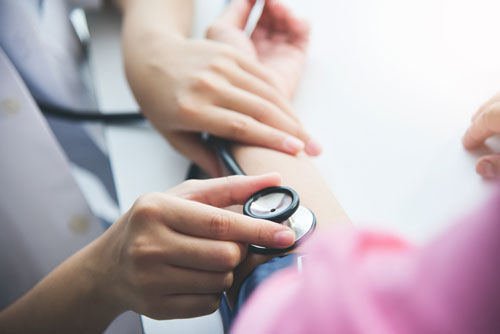We all know that high blood pressure is bad for us. But what about low blood pressure?
The question is important because of new blood pressure guidelines.
They say hypertension should be treated in most adults when the systolic (upper number) is greater than 130. The old recommendations were 140.
A new study has found that some people may be doing themselves more harm than good by lowering their BP too much. They could be setting themselves up for a trip to the emergency room or worse.
Researchers from Kaiser Permanente in California wanted to find out if lowering blood pressure could cause unintended health problems.1
They reviewed the health records of more than 475,000 patients who were on blood pressure medication. The patients’ mean age was 65.2
During the one-year study period, the researchers noted when a patient’s systolic blood pressure had dropped below 110 mmHg.
Patients whose blood pressure fell this low had a 50% greater risk of serious falls and fainting.
About 40 million Americans are taking high blood pressure medication.3
The study indicates that almost 12 million of them could be putting themselves at risk of falling or fainting by lowering their blood pressure too much.
Falls are the leading cause of accidental death in people over 65.4 They are also the most common cause of emergency room admissions.
Dr. John Sim is a nephrologist with Kaiser Permanente Los Angeles Medical Center. He was the study’s lead author.
“Physicians considering lower blood pressure targets for their patients should weigh the risks and benefits of aggressive blood pressure lowering on an individual basis, especially in older patients,” said Dr. Sim.
Lower Your Blood Pressure Naturally
If you have borderline high blood pressure, don’t let your doctor automatically put you on drugs. Particularly if you are over 65.
There are some steps you can take to reduce hypertension without risking a dangerous fall.
First, make sure that you have high blood pressure in the first place.
A Canadian study found that 20% of patients who’ve been diagnosed with high blood pressure actually don’t have it.5
Before your doctor takes your blood pressure, make sure that you sit quietly for at least five minutes.
Don’t exercise, consume caffeine, or smoke within 30 minutes of your test. And make sure that during the reading, your arm is supported on a surface level with your heart.
If your reading is still high, there are natural remedies you can try.
3 Natural Blood Pressure Medicines
- Berries. One study found that eating a handful of blueberries once a week lowers the risk of high blood pressure by 10%. Blueberries, raspberries, and blackberries contain powerful antioxidants called anthocyanins that reduce blood pressure.
- Hibiscus Tea. Researchers found that one daily cup of herbal tea containing the hibiscus flower lowers both systolic (the upper number) and diastolic (the lower number) blood pressure by over 15 points in just four weeks. You can buy hibiscus tea at most health food stores and online. Like berries, hibiscus flowers are loaded with anthocyanins.
- Beet Juice. An Australian study had subjects drink either beet juice or a placebo. Scientists found that within hours of drinking beet juice, subjects’ blood pressure dropped 5 points. The placebo group had no drop in blood pressure. Subsequent studies confirmed the effect. Beet juice is high in naturally occurring nitrates, which open blood vessels.
Editor’s Note: Something strange was happening to pilots training to fly F-16 fighter jets.
The ones who went into the program with elevated blood pressure were coming out a few weeks later with normal, healthy readings. They hadn’t taken any medications. Their diets hadn’t changed. They hadn’t made any changes to their exercise regimens.
Go HERE to discover their secret. And how you could lower your blood pressure up to 15 points from your living room using this same trick.
Related Articles
One Tropical Fruit Lowers Blood Pressure
The 5-Minute-a-Day Blood Pressure Solution
This Blood Pressure Drug Could Give You Cancer
Like this Article? Forward this article here or Share on Facebook.
References:
1 https://www.eurekalert.org/pub_releases/2018-08/kp-hli082418.php
2 https://www.ajpmonline.org/article/S0749-3797(18)31938-X/fulltext
3 https://www.cdc.gov/bloodpressure/
4 https://www.merckmanuals.com/professional/geriatrics/falls-in-the-elderly/falls-in-the-elderly
5 https://www.institutefornaturalhealing.com/2017/04/really-high-blood-pressure/

